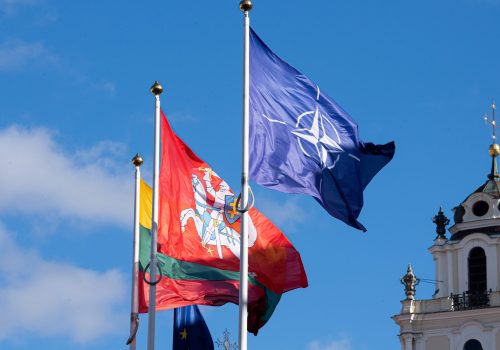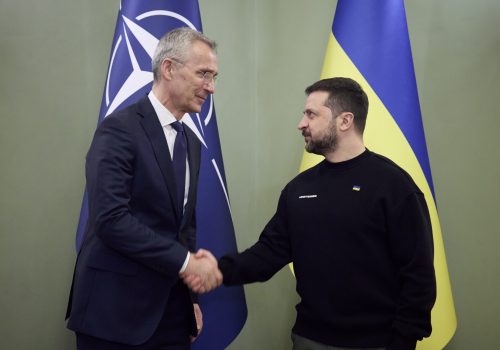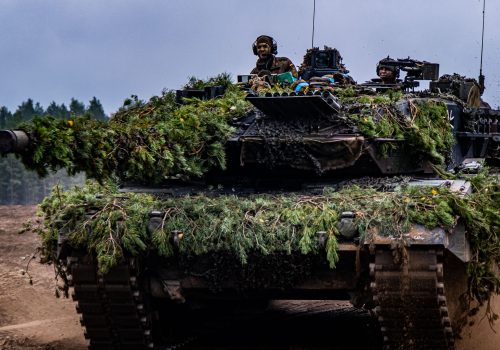Ukraine needs NATO membership, not an ‘Israel model’
As Ukraine undertakes a challenging and costly counteroffensive against Russia’s invasion, NATO members are discussing how to reinforce Kyiv’s military capacities and ensure its long-term sovereignty. The Biden administration has reportedly told Congress it wants a security assistance model based on the United States’ relationship with Israel. This approach, an alternative to Ukraine’s membership in NATO, is a mistaken application of Israel’s geopolitical circumstances, one that would indefinitely perpetuate Russia’s aggression.
For decades, the United States has reinforced Israel’s security by providing it $2-4 billion in annual military assistance. Today, that assistance is codified in a ten-year agreement directing $38 billion in military aid to Israel between 2019 and 2028. While Washington does not provide Israel with security guarantees—commitments to intervene militarily in the event of an attack—its military aid has enabled Israel to develop one of the world’s premier fighting forces.
Those advocating this model for Ukraine fear that extending NATO membership to Kyiv today would drag the Alliance into a war with dangerous escalatory risks. Long-term security assistance arrangements, they assert, can sustain Ukraine’s qualitative military edge over Russia. That will eventually break Moscow’s will and lead to a peace settlement, they argue, after which Ukraine can be granted NATO membership.
Indeed, US assistance has been critical to Israel’s survival. Israeli fighters, like their Ukrainian counterparts, are admired around the world for their courage, tenacity, and ingenuity. But that is where the similarities end. Ukraine faces a far different and ultimately more challenging threat.
Israel’s adversaries in the Islamic world are not major powers. They are disparate and often divided. Some are poor and suffer from significant internal schisms. None of their militaries are highly capable. Some have been defeated by Israel. None are armed with nuclear weapons. Israel, by contrast, like Russia, has nuclear weapons. Ukraine does not. Kyiv gave up its nuclear deterrent in 1994 under pressure from the United States and other NATO countries.
Moreover, several of Israel’s previous adversaries are now its security partners. Some have been beneficiaries of Western economic aid and military equipment. These relationships enable the West to exercise some, though not always decisive, influence over their actions. The West is not on track to have similar leverage over Russian President Vladimir Putin’s Russia.
If the transatlantic community consigns Kyiv to the Israel model, Ukraine will be left indefinitely in the gray zone of insecurity that has repeatedly catalyzed Putin’s hegemonic ambitions into violent actions.
Nor has the Israel model prevented aggression. Israelis have endured decades of artillery fire, missile strikes, and cross-border terrorist attacks—including those orchestrated by Iran, which arguably faces stricter Western sanctions than those imposed on Russia.
Kyiv confronts a far more significant adversary. Russia is a massive unitary state whose population is more than three times greater than Ukraine’s and whose economy is ten times larger. Moscow’s determination to obliterate Ukraine and its history far exceeds the collective intensity of Israel’s adversaries.
Sustaining Ukraine under such circumstances will be exponentially more expensive than what the United States has provided Israel. The Kiel Institute for the World Economy estimates that Ukraine has received more than $150 billion in military, economic, and humanitarian assistance commitments in just the first year of the war. Of that total, $77 billion came from the United States alone.
If the transatlantic community consigns Kyiv to the Israel model, Ukraine will be left indefinitely in the gray zone of insecurity that has repeatedly catalyzed Putin’s hegemonic ambitions into violent actions. Ukraine would have to consider its options. Regardless of US economic and military assistance, Israel has often undertaken military actions against its adversaries that have contradicted the desires of its Western benefactors. Israel developed its own nuclear arsenal. Why wouldn’t Ukraine do the same?
As long as NATO is not fully committed to defending the security of Ukraine, Putin will continue his violent quest, especially if he believes continuing the conflict is the key to preventing Ukrainian membership in the Alliance. Putin must not be given an indefinite veto over transatlantic security.
Granting NATO membership to Ukraine is critical to ensuring it wins the war against Russia quickly and decisively. It is the most unambiguous way to demonstrate to Putin that suborning Ukraine is unachievable and wasteful. It is the most reliable way to ensure such aggression never happens again.
Establishing an Alliance force posture to credibly deter Russian aggression against Ukraine will be far less financially onerous than reinforcing and sustaining Ukraine’s defenses and rebuilding its economy under perpetual wartime conditions.
NATO could extend its security guarantee to the territory Ukraine controls at the time of accession. The rest of Ukraine could be addressed in the future; such was the case of Germany, as a third of its territory was controlled by the Soviet Union when it joined the Alliance. Moscow would then have to decide whether to expand its war to the Alliance. Recent events have demonstrated that Russian forces are clearly not prepared for that task.
As allied leaders approach their summit meeting in Vilnius, Lithuania, on July 11, the United States is remarkably alone in its reluctance to grant Kyiv an invitation and clear roadmap to NATO membership. Taking that step is essential to reinforce the morale of the Ukrainian people at a decisive moment in this war, convince Moscow that its hegemonic ambitions are unachievable, and establish military stability along Europe’s frontier with Russia.
This is in the interest not just of Ukraine. It is to the strategic benefit of the transatlantic community.
Ian Brzezinski is a senior fellow at the Atlantic Council. Formerly, he served as US deputy assistant secretary of defense for Europe and NATO policy.
Further reading
Tue, Apr 11, 2023
Defining success for NATO’s Vilnius summit: A primer
Issue Brief By
A successful NATO summit in July requires significant progress on a host of NATO’s political and military priorities, especially those enumerated at Madrid.
Wed, Jul 5, 2023
Here’s the ‘concrete’ path for Ukraine to join NATO
New Atlanticist By Franklin D. Kramer, Hans Binnendijk, Christopher Skaluba
The upcoming NATO summit in Vilnius should establish a High Level Group to design a roadmap for Ukraine’s fast-track membership.
Tue, Apr 18, 2023
NATO deterrence and defense: Military priorities for the Vilnius Summit
Issue Brief By Franklin D. Kramer
Ahead of the NATO Summit in Vilnius, this issue brief sets forth six priority actions that NATO should undertake to enhance its deterrent and defense posture.
Image: Ukrainian and Israeli flags are pictured during the opening of the Israeli field hospital in Lviv Region, western Ukraine.


